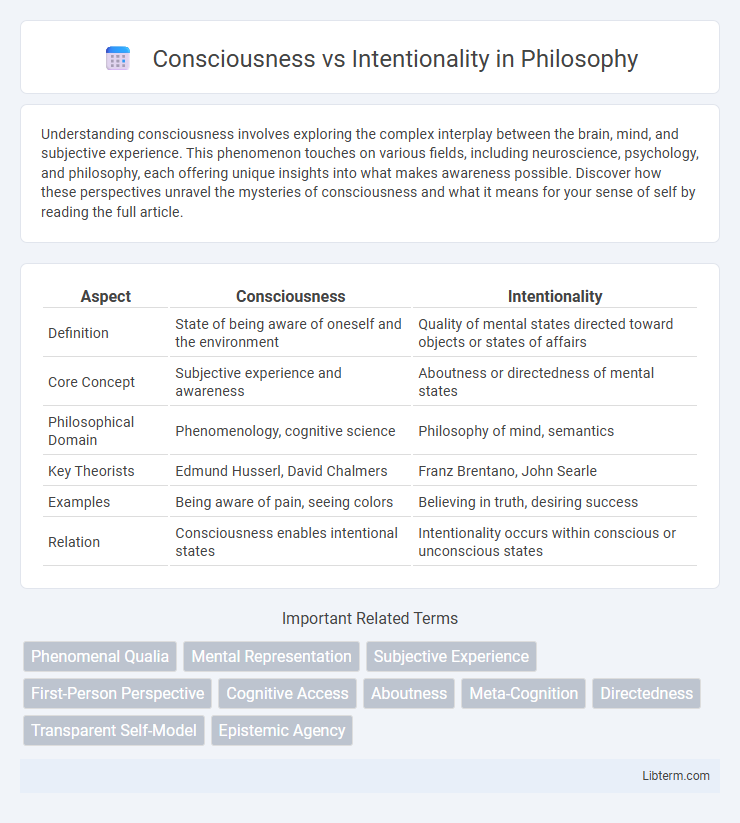Understanding consciousness involves exploring the complex interplay between the brain, mind, and subjective experience. This phenomenon touches on various fields, including neuroscience, psychology, and philosophy, each offering unique insights into what makes awareness possible. Discover how these perspectives unravel the mysteries of consciousness and what it means for your sense of self by reading the full article.
Table of Comparison
| Aspect | Consciousness | Intentionality |
|---|---|---|
| Definition | State of being aware of oneself and the environment | Quality of mental states directed toward objects or states of affairs |
| Core Concept | Subjective experience and awareness | Aboutness or directedness of mental states |
| Philosophical Domain | Phenomenology, cognitive science | Philosophy of mind, semantics |
| Key Theorists | Edmund Husserl, David Chalmers | Franz Brentano, John Searle |
| Examples | Being aware of pain, seeing colors | Believing in truth, desiring success |
| Relation | Consciousness enables intentional states | Intentionality occurs within conscious or unconscious states |
Defining Consciousness: Core Concepts
Consciousness encompasses the state of being aware of and able to think about oneself and the environment, characterized by subjective experiences or qualia. Core concepts include wakefulness, self-awareness, and the ability to experience emotions and sensations. Intentionality, distinct yet related, refers to the mind's capacity to represent objects and states of affairs, emphasizing the directedness of mental states toward something.
Understanding Intentionality in Philosophy
Intentionality in philosophy refers to the capacity of the mind to represent or be about objects, properties, or states of affairs, distinguishing it from mere consciousness, which is the state of being aware. Understanding intentionality involves analyzing how mental states like beliefs, desires, and thoughts are directed toward specific content, enabling meaningful engagement with the world. Philosophers such as Franz Brentano and Edmund Husserl have significantly contributed to explicating intentionality as a fundamental characteristic of mental phenomena.
Historical Perspectives on Consciousness and Intentionality
Historical perspectives on consciousness and intentionality trace back to classical philosophy, where Aristotle explored the notion of intentionality as the mind's capacity to be about or represent objects. Medieval scholastics further developed these ideas by distinguishing between the mind's awareness (consciousness) and its directedness toward objects (intentionality). In the 20th century, phenomenologists like Husserl revitalized intentionality as the defining feature of consciousness, emphasizing its role in shaping subjective experience and meaning.
Key Differences Between Consciousness and Intentionality
Consciousness refers to the state of being aware of and able to think about one's own existence, sensations, and surroundings, while intentionality is the quality of mental states that are directed toward an object or represent something. Key differences include that consciousness encompasses subjective experience and awareness, whereas intentionality specifically involves the aboutness or directedness of thoughts and perceptions. Neuroscientific research highlights that consciousness relies on widespread brain networks for awareness, whereas intentionality is linked to specific cognitive processes underlying representation and mental content.
Overlaps and Interactions: Where Consciousness Meets Intentionality
Consciousness and intentionality overlap in their role as fundamental aspects of mental states, where consciousness provides the experiential awareness of thoughts, and intentionality refers to the directedness or aboutness of those thoughts toward objects or states of affairs. Interactions between these concepts occur when conscious awareness accompanies intentional states, enabling reflective thought and self-awareness, which are critical for higher-order cognitive functions. Neuroscientific studies reveal that brain regions associated with conscious processing, such as the prefrontal cortex, also facilitate intentionality by integrating sensory inputs with goal-directed plans.
Intentionality Without Consciousness: Is It Possible?
Intentionality without consciousness refers to mental states directed at objects or states of affairs without the individual being consciously aware of them, frequently observed in phenomena like blindsight or unconscious biases. Neuroscientific studies suggest that the brain can process information and generate goal-directed behavior without involving conscious experience, indicating that intentionality may operate independently from conscious awareness. This challenges traditional philosophical views that equate intentionality exclusively with conscious thought, opening new avenues for understanding cognitive processes underlying decision-making and action.
The Role of Intentionality in Cognitive Science
Intentionality in cognitive science refers to the capacity of the mind to represent objects and states of affairs, directing thoughts towards specific goals or meanings. It plays a crucial role in understanding mental states by linking consciousness to purposeful action and interpretation within cognitive models. This relationship helps differentiate raw conscious experience from the purposeful, directed nature of cognitive processes that generate meaning and guide behavior.
Consciousness in Non-Human Animals: The Debate
Consciousness in non-human animals remains a prominent topic in cognitive science and philosophy, with studies examining neural correlates and behavioral indicators to assess subjective experience. Research on primates, cetaceans, and certain bird species reveals complex problem-solving, self-recognition, and emotional responses suggestive of consciousness beyond mere instinctual activity. Debates center on differentiating true phenomenal consciousness from sophisticated intentionality, emphasizing the need for refined methodologies like neuroimaging and behavioral tests to clarify the extent and nature of animal awareness.
Implications for Artificial Intelligence: Consciousness vs Intentionality
Consciousness involves subjective experience and self-awareness, whereas intentionality refers to the capacity of mental states to be about or represent objects and states of affairs. In artificial intelligence, emphasizing intentionality allows systems to process and manipulate representations of the world without requiring genuine consciousness. This distinction shapes AI development by prioritizing functional goal-directed behavior over replicating human-like subjective awareness.
Future Directions: Bridging the Gap Between Consciousness and Intentionality
Future research in consciousness and intentionality aims to integrate neuroscientific findings with phenomenological models to clarify how subjective experiences arise from intentional states. Advances in neuroimaging and computational modeling hold promise for mapping the neural correlates that underpin both conscious awareness and purposeful mental acts. Bridging this gap will enhance understanding of cognitive processes, potentially informing artificial intelligence design and treatments for disorders of consciousness.
Consciousness Infographic

 libterm.com
libterm.com